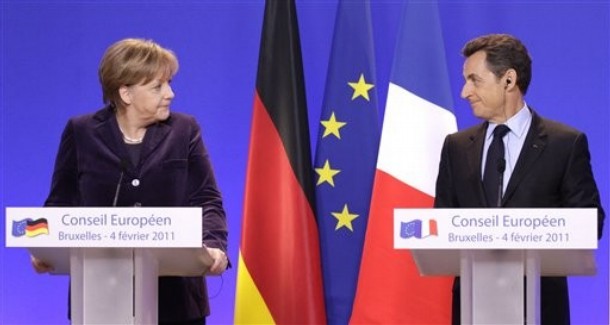
From Stephen Castle, the International Herald Tribune: For decades Germans wanted to become more European and took care not to be seen bossing around their allies on the Continent. But now that the government in Berlin wants Europe to become more like Germany, the temperature is rising.
At a meeting of European Union leaders this month, tempers flared when Germany, strongly backed by France, called on countries using the euro to agree to a pact enforcing German-style fiscal discipline and wage restraint. …
But it also poses a more fundamental question, one laden with history and fraught with emotion, not just for smaller European countries, but for France as well: Is the rest of Europe ready to accept overt German leadership?
“Usually the Franco-German entente would mean that France would decide the music and Germany would foot the bill,” said Frans Timmermans, a Dutch center-left parliamentarian who was until last year the Netherlands’ minister for European affairs. “This was the case for 40 years — now we see a reversal. …”
Over that ill-tempered lunch on Feb. 4, Jean-Claude Juncker, prime minister of Luxembourg, complained of learning of Berlin’s plans from newspapers, and Prime Minister Donald Tusk of Poland described being left out of the process that led to the pact as humiliating, according to officials and diplomats not authorized to speak publicly.
Then the Czech leader, Petr Necas, compared Germany’s confidential blueprint outlining its proposals — which was leaked to newspapers but not given to leaders — to sightings of the Yeti.
But much more is at stake than bruised egos. Germany is making its so-called pact for competitiveness the price for agreeing to expand the rescue fund set up for the euro zone. It will be introduced through an idea long championed in Paris — but until now resisted in Berlin — that could become an embryonic economic government for the euro zone as a whole. …
[German Chancellor Angela] Merkel’s competitiveness pact is bound to be watered down as it moves through the tortuous process of European agreement. It begins with a summit meeting March 11, where leaders of the euro zone countries are likely to argue well into the night even before inviting the other 10 E.U. countries that do not use the euro to join their pact.
The goal is to settle on a package of measures by late March, at yet another summit meeting where the bloc hopes to agree on creating a larger bailout fund for the euro’s most vulnerable nations. (photo: AP)
Image: ap%202%2015%2011%20Angela%20Merkel%20Nicolas%20Sarkozy.jpg
